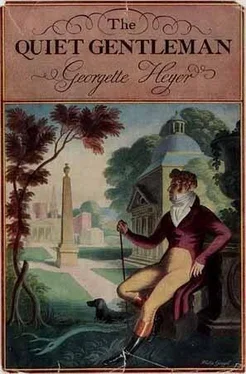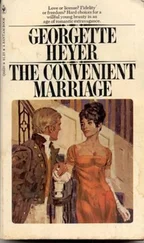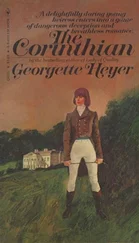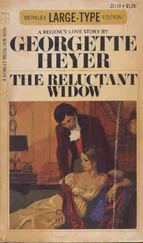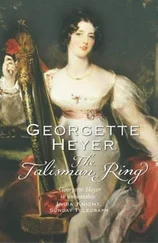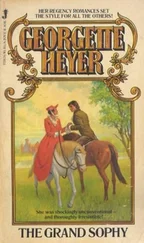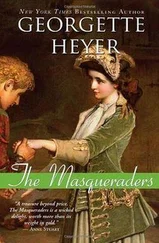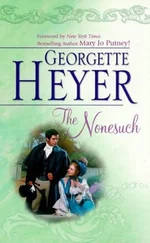“It is some years since you have seen my cousin, ma’am,” Mr. Frant interposed, in a measured tone.
“I hope,” said the Dowager, “I am not to be blamed for that! If Lady Penistone chose to invite the boy to stay with her during his school-vacations, and my lord to acquiesce in the arrangement, I take heaven to witness that it was by no expressed wish of mine that Desborough ceased to regard Stanyon as his natural home! On every head my conscience is easy: while he was a child I did my duty towards him; and I am determined now that as no word of censure for his conduct in absenting himself from a beloved parent’s obsequies shall be permitted to pass my lips, so also no mark of the respect due to the Head of the Family shall be unobserved. I shall receive him in the Hall.”
This momentous decision being faithfully adhered to, a chilly afternoon in spring saw five persons assembled in what had once been the Great Hall of the Castle. The artistic energies of several generations had largely obliterated most of its original features, but the hammer-beams in its lofty roof remained, and a vast fireplace, made to accommodate the better part of several tree-trunks. The carved screens, having been discovered to have become worm-eaten, had been removed in a previous age, the apartment being thrown open to the vestibule, or entrance-hall, situated at right-angles to it. From this smaller apartment the Grand Staircase, erected in the latter half of the seventeenth century on a scale designed to allow some dozen persons to walk up it abreast, rose in one imposing flight to a broad half-landing, whence it branched to right and left, thus attaining the main gallery of the Castle. Several massive doors strengthened by applied iron-straps, besides the great front-door opposite to the staircase, opened on to the vestibule, a circumstance which added nothing to the comfort of the Hall, in itself a passage to a series of saloons beyond it. The heat thrown out by the logs burning in the fireplace was considerable, but was unavailing to prevent the draughts sweeping through the room. These seemed to come from all quarters, even the heavy curtains which had been drawn across the windows composing almost the entire long wall opposite the fireplace being continually stirred by them. It was dusk, and candles had been lit in the sconces as well as in the several candelabra which stood on the various tables. The little tongues of flame flickered continually, causing the wax to melt unevenly, and making it impossible for one of the persons assembled in the Hall to set the stitches in her embroidery with any degree of accuracy. Having twice changed her seat to no purpose, she folded the work, and replaced it in a tapestry-bag, drawing forth, in its stead, a prosaic piece of knitting, with which she proceeded to occupy herself, in the manner of one prepared to make the best, without comment, of adverse conditions.
The furnishings of the Hall might have been taken as an example of the heterogeneous nature of the whole Castle, few of the pieces which it contained having been chosen with any nicety of judgment. A fine refectory table, pushed under the windows, and several carved oak chairs with wooden seats, were the only objects which bore any particular relation to their surroundings, the rest of the furniture consisting of pieces representative of every age and style, and including a modern and very ugly side-table, with a marble top, supported by brazen gryphons’ heads. Two suits of armour of the surcoatless period guarded the entrance, and several shields, pikes, halberds, and gisarmes were arranged upon the wall above the high plaster mantelpiece. These were flanked by a full-length portrait of the late Earl, leaning negligently with one leg crossed over the other, against the shoulder of his horse; and a fine Battle-piece, of which the most noticeable features were the arresting figure of the commanding officer in the foreground, and the smoke issuing in woolly balls from the mouths of innumerable cannons.
Only one of the five persons gathered round the fireplace in expectation of the Earl’s arrival seemed to be conscious of the discomfort of her situation, and she made no complaint, merely shifting her chair so that the leaping flames should not scorch her face, and pinning her shawl securely across her shoulders to protect them from the cold blast from the vestibule. The Dowager Countess, regally enthroned in a wing-chair, with her feet upon a stool, was indifferent to draughts; neither her son, Martin, moodily standing before the fire, and kicking at a smouldering log, nor Mr. Theodore Frant, engaged in snuffing a candle in the branch set in the centre of the refectory table, was aware of any unusual chilliness; and the Chaplain, seated at her ladyship’s left hand, had long since become inured to the Spartan conditions prevailing at Stanyon, and had pronounced the gathering to be very snugly placed. This tribute earned him a gracious smile from the Dowager, who said that it had frequently been remarked that few fires gave out so fierce a heat as this one. She then desired Miss Morville, in a voice of mingled civility and condescension, to be so good as to run up to the Crimson Saloon, and to fetch from it a little hand-screen. Miss Morville at once laid aside her knitting, and departed on her errand; and, as though her absence released him from constraint, Martin looked up from his scowling scrutiny of the fire, and exclaimed: “This is a curst business! I wish it were well over! Why must we kick our heels here, waiting on his pleasure? The lord knows we don’t want him! I have a very good mind to ride over to eat my mutton with Barny!”
His cousin looked frowningly at him for a moment, but said nothing. Another candle needed attention, and he dealt with it methodically. He was a powerfully built man, nearing his thirtieth birthday, with a resolute, rather square countenance, and a good deal of reserve in his manner. The cast of his features bore a certain resemblance to that of his young cousin’s, but the likeness existed merely in the aquiline trend of the nose, the sightly heavy line of the jaw, and the set of the eyes under brows which overhung them enough to give a forbidding look to the face. The colour of his eyes was a clear, light gray, as cool and as inexpressive as lake-water; his mouth, with its firmly closed lips, betrayed no secrets, but seemed to show that its owner, besides possessing resolution of character, knew how to keep his own counsel. His address was good, and his manner had all the quiet assurance of his breeding.
With Martin, it was otherwise. Every change of mood was reflected in his eyes, so dark a brown as to appear almost black, and in the sensitive curves of his full mouth. Six years younger than his cousin, he had not altogether thrown off the boy; and, from having been the idol of his mother and the pet of his father, he was a good deal spoiled, impatient of restraint, thrown into the sulks by trifling causes, and into wild rages by obstacles to his plans. Treated from his earliest youth as though he, and not his half-brother, had been his father’s heir, it was not to be expected that he could face with equanimity the succession of the seventh Earl. A vague belief that his brother would not survive the rigours of the campaign in Spain had fostered in him the unexplored thought that he would one day step into his father’s shoes; the emergence of the seventh Earl, unscathed, from the war found him unprepared, and filled him, when his first shocked incredulity had passed, with a sense of burning resentment. He had only a slight recollection of the brother seven years his senior, his memory retaining little beyond the impression of a fair, quiet boy, with a gentle manner, and a very soft voice; but he was sure that he would dislike him. He said, with a defiant glance cast in the direction of his impassive cousin: “I daresay it is past six o’clock already! When are we to dine? If he thinks to bring town ways to Stanyon, I for one won’t bear it!”
Читать дальше
